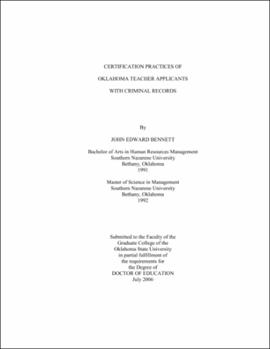| dc.contributor.advisor | Stern, A. Kenneth | |
| dc.contributor.author | Bennett, John Edward | |
| dc.date.accessioned | 2013-11-26T08:34:12Z | |
| dc.date.available | 2013-11-26T08:34:12Z | |
| dc.date.issued | 2006-07 | |
| dc.identifier.uri | https://hdl.handle.net/11244/7314 | |
| dc.description.abstract | Scope and Method of Study: This study was to determine the impact of several teacher certification laws, policies, and procedures on the screening process of first-time teacher applicants in Oklahoma. Specifically studied were two laws, 70 O.S. 2001, section 6-190 (B)(6) and 70 O.S. Supplement 2004, section 6-190 (D), enacted in November 2001 and July 2004, respectively, and the decisions made by persons in leadership positions within the OSDE regarding the implementation of these and other laws relative to criminal history background checks for teacher credentialing purposes. Demographic, certification, and criminal history information were studied on the teachers and teacher applicants from January 1, 2000 through December 31, 2004, who had criminal record. Comparisons were made of different subsets of subjects depending upon when they applied for teacher certification to determine the effectiveness of the two aforementioned laws. Additional reviews of the teacher certification decisions by the state department of education were conducted to determine the successes of the laws at keeping undesirable teachers with criminal records from receiving teaching credentials. | |
| dc.description.abstract | Findings and Conclusions: Overall, 4.95 percent of the population had a criminal record (999 of 20,168). A most significant finding was that prior to the fingerprint-based background check laws, only 1.12 percent of out-of-state applicants were discovered with criminal records (through employment-based searches). But, this percentage jumped to 27.27 percent once the second law was enacted requiring all out-of-state applicants to submit to a criminal background check. The two laws were successful in identifying teacher applicants with criminal records who might otherwise have gone undetected through employment background checks and self-disclosure on the application for an Oklahoma teaching license. However, the success of the laws may be diminished by decisions of the state department of education to issue a teaching credential to teacher applicants with a criminal record. | |
| dc.format | application/pdf | |
| dc.language | en_US | |
| dc.rights | Copyright is held by the author who has granted the Oklahoma State University Library the non-exclusive right to share this material in its institutional repository. Contact Digital Library Services at lib-dls@okstate.edu or 405-744-9161 for the permission policy on the use, reproduction or distribution of this material. | |
| dc.title | Certification practices of Oklahoma teacher applicants with criminal records | |
| dc.contributor.committeeMember | Harris, Edward L. | |
| dc.contributor.committeeMember | Mathers, Judith | |
| dc.contributor.committeeMember | Self, Mary Jo | |
| osu.filename | Bennett_okstate_0664D_1973 | |
| osu.accesstype | Open Access | |
| dc.type.genre | Dissertation | |
| dc.type.material | Text | |
| thesis.degree.discipline | Educational Leadership | |
| thesis.degree.grantor | Oklahoma State University | |
